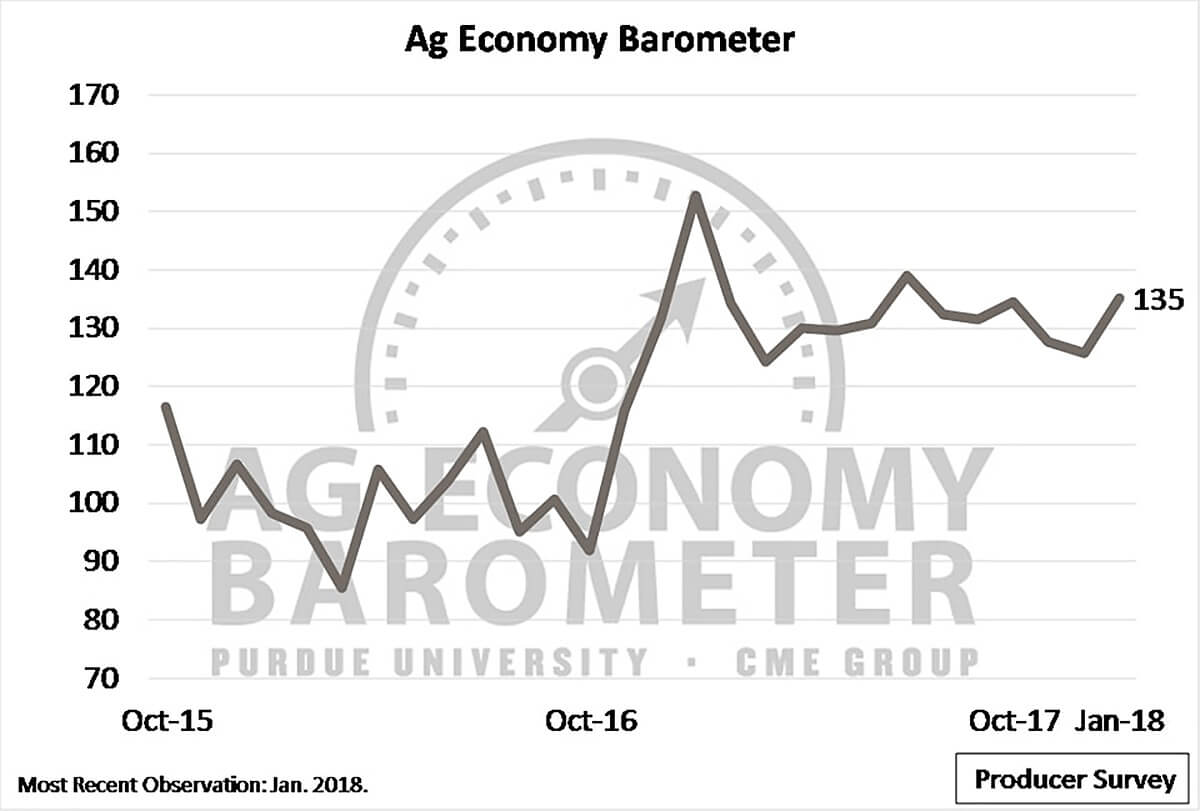Producers more optimistic in January; many expect lower taxes
Agricultural producers said in January that they were more optimistic about the agricultural economy than a month prior, according to the Purdue University/CME Group Ag Economy Barometer.
The January barometer read 135, up 9 points from December’s 126. The uptick was driven by increases in both the Index of Current Conditions, which climbed 5 points to 144, and the Index of Future Expectations, which climbed 11 points to 131.This marks the largest one-month improvement in future expectations since January 2017.
The barometer is based on a monthly survey of 400 agricultural producers from across the U.S. Each month, survey respondents are asked whether their farm operations are financially better off, worse off, or about the same. In January, 43 percent said their farms were financially worse off than a year ago, while 14 percent said their farms were financially better off.
According to James Mintert, director of Purdue University’s Center for Commercial Agriculture and the barometer’s principal investigator, the 43 percent number is significant.
“To help put January’s responses in perspective, the percentage of farmers who felt their operations were financially worse off reached a high of 81 in August 2016,” he said. “Since April 2017, the share reporting that their farms were financially worse off has consistently fallen below 50 percent. The reduction has been an important driver of the ongoing improvement in the Index of Current Conditions.”
Another potential driver of producer sentiment in January was the passage of the Tax Cuts and Jobs Act of 2017. Surveyed producers were asked to rate the likely impact on their farming operations, as well as their families’ tax burdens. Nearly half of all producers said they expect the tax bill to be beneficial to their operations. Conversely, 19 percent said they expect the tax bill to have a negative impact on their farming operations. The remaining 35 percent gave a neutral response.
When it came to producers’ expectations for their families’ tax burdens, 43 percent said they expect a decline, 18 percent expect an increase, and 40 percent said they expect their families’ tax burdens to stay about the same.
“It’s possible the 40 percent of respondents expecting no changes in their taxes and the 35 percent who provided a neutral rating could reflect uncertainty regarding the specific content of the tax bill and the fact that IRS regulations implementing the tax bill have yet to be issued,” Mintert said.
Each quarter, a parallel survey gauges the sentiment of 100 agricultural thought leaders. Sentiment among thought leaders declined sharply from October’s survey, falling from 152 to 127. The decline in agricultural thought leaders’s sentiment was driven in part by their more negative perspective on current conditions than they had last fall.
Read the full January Ag Economy Barometer and Ag Thought Leaders Survey report at purdue.edu/agbarometer.
The quarterly Ag Economy Barometer webinar will be Feb. 8 at 1:30 p.m. Barometer researchers will discuss the drivers of sentiment. Register for the free webinar at https://ag.purdue.edu/commercialag/ageconomybarometer/update/.
The Ag Economy Barometer, Index of Current Conditions and Index of Future Expectations are available on the Bloomberg Terminal under the following ticker symbols: AGECBARO, AGECCURC and AGECFTEX.
About the Purdue University Center for Commercial Agriculture
The Center for Commercial Agriculture was founded in 2011 to provide professional development and educational programs for farmers. Housed within Purdue University’s Department of Agricultural Economics, the center’s faculty and staff develop and execute research and educational programs that address the different needs of managing in today’s business environment.
About CME Group
As the world’s leading and most diverse derivatives marketplace, CME Group (www.cmegroup.com) enables clients to trade futures, options, cash and OTC markets, optimize portfolios, and analyze data – empowering market participants worldwide to efficiently manage risk and capture opportunities. CME Group exchanges offer the widest range of global benchmark products across all major asset classes based on interest rates, equity indexes, foreign exchange, energy, agricultural products and metals. The company offers futures and options on futures trading through the CME Globex® platform, fixed income trading via BrokerTec and foreign exchange trading on the EBS platform. In addition, it operates one of the world’s leading central counterparty clearing providers, CME Clearing. With a range of pre- and post-trade products and services underpinning the entire lifecycle of a trade, CME Group also offers optimization and reconciliation services through TriOptima, and trade processing services through Traiana.
CME Group, the Globe logo, CME, Chicago Mercantile Exchange, Globex, and E-mini are trademarks of Chicago Mercantile Exchange Inc. CBOT and Chicago Board of Trade are trademarks of Board of Trade of the City of Chicago, Inc. NYMEX, New York Mercantile Exchange and ClearPort are trademarks of New York Mercantile Exchange, Inc. COMEX is a trademark of Commodity Exchange, Inc. BrokerTec, EBS, TriOptima, and Traiana are trademarks of BrokerTec Europe LTD, EBS Group LTD, TriOptima AB, and Traiana, Inc., respectively. Dow Jones, Dow Jones Industrial Average, S&P 500, and S&P are service and/or trademarks of Dow Jones Trademark Holdings LLC, Standard & Poor’s Financial Services LLC and S&P/Dow Jones Indices LLC, as the case may be, and have been licensed for use by Chicago Mercantile Exchange Inc. All other trademarks are the property of their respective owners.







